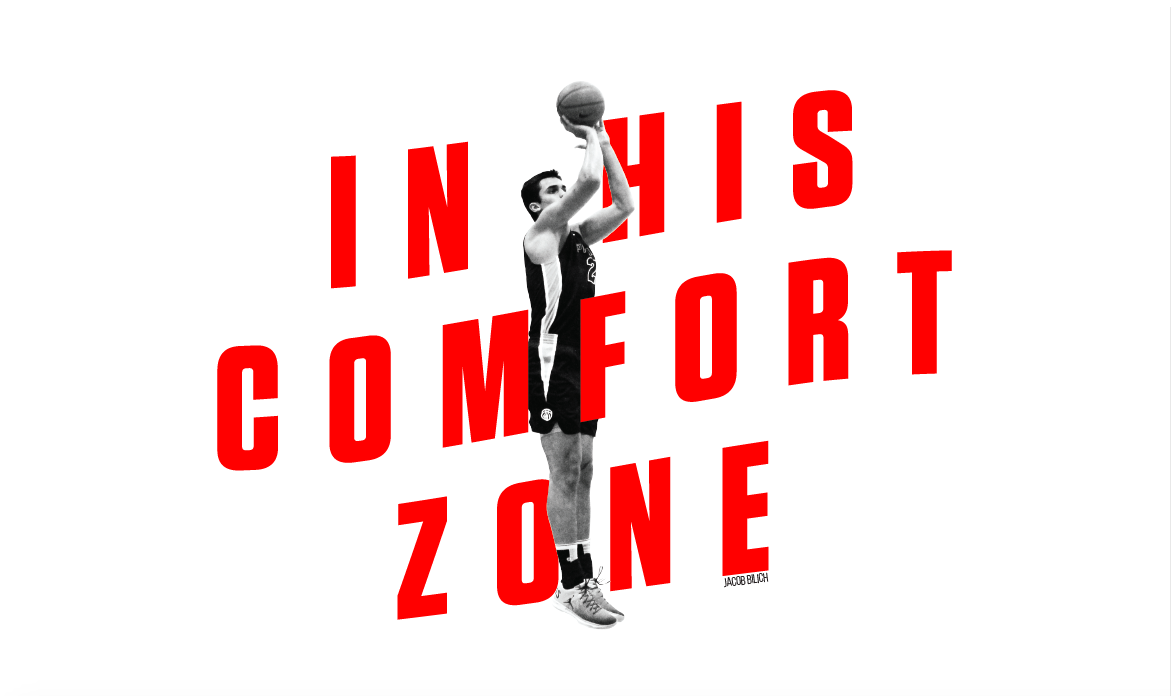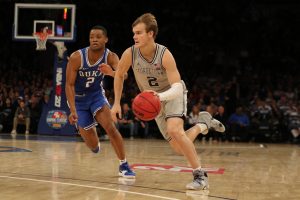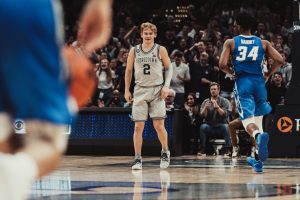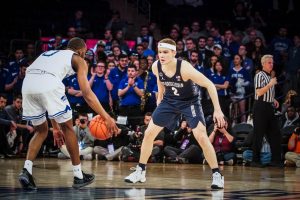Junior men’s basketball player Omer Yurtseven has taken an unusual path to Georgetown. He mentioned Georgetown’s top-tier academics, the Hoyas’ team culture, and the presence and experience of head men’s basketball coach Patrick Ewing as key reasons for transferring to the Hilltop. But Yurtseven, a practicing Muslim, had another priority–the diversity of Washington, D.C., and Georgetown’s reputation for religious tolerance.
Three years ago, Yurtseven, who is Turkish, was playing professionally for the EuroLeague club Fenerbahçe in Istanbul, Turkey. He started playing basketball at age 8, became more serious in his teenage years, and was signed to Fenerbahçe’s senior squad at 15. In May 2016, Yurtseven made international headlines after scoring 91 points and grabbing 28 rebounds in a U18 game for Fenerbahçe.
Unlike the large majority of elite European basketball prospects, Yurtseven decided to play collegiate basketball instead of entering the NBA straight from his Turkish professional team. Just one day after his record performance, he turned down a multi-year contract from Fenerbahçe and scholarship offers from other U.S. universities to commit to North Carolina State University in Raleigh, North Carolina.
“Everybody said I could have [played professionally] and I was offered a contract, but I decided to get a better education by coming to the States,” Yurtseven said.
Due to NCAA eligibility rules, Yurtseven was suspended for the first nine games of the 2016-17 season, his freshman year. He struggled in his first year at NC State, averaging just 5.9 points per game. But he thrived under a new pick-and-roll style offense in the 2017-18 campaign, following the arrival of a new head coach, Kevin Keatts. That year, as a sophomore, Yurtseven averaged 13.5 points per game. NCAA basketball experts suggested that he would have been a first-round pick if he left for the NBA draft in 2018. Yurtseven did end up leaving Raleigh; however, instead of going to the NBA, he opted to transfer to a different university to continue his academic and athletic careers. He decided on Georgetown.
Yurtseven’s decision to relocate to Washington comes during a nationwide rise in Islamophobia and anti-Muslim hate crimes. According to Yurtseven, there were “a few events” that caused him to feel uncomfortable in Raleigh. He declined to elaborate with more specific details, but the Raleigh area has recently seen several high-profile acts of Islamophobia, some violent.
In 2013, the North Carolina Legislature passed a law, colloquially known as the “anti-Sharia” bill, that banned state courts from applying foreign laws. The North Carolina Bar Association, an independent organization of legal professionals, said the bill was unnecessary, and critics argued that its only purpose is to foment anti-Muslim sentiments.
Then, in 2015, three Muslim students were murdered by a neighbor in their Chapel Hill, North Carolina apartment. While media outlets appeared to conclude that the motive behind the homicide was a parking dispute, the killer’s Facebook page was littered with anti-Christian and anti-Muslim posts, according to an analysis by the Los Angeles Times.
During a 2017 Raleigh city council race, a Muslim candidate’s campaign sign was vandalized with racist text, a swastika, and the name “Trump.”
Acts of Islamophobia are not limited to Raleigh, nor to recent years. The rate of anti-Muslim hate crimes in the United States increased five-fold following the Sept. 11, 2001 terrorist attacks. According to data from the Pew Research Center, the total number of documented assaults against Muslims in 2016 eclipsed 2001 levels, their previous peak, and a ban on travel from certain Muslim majority countries is the official policy of the United States.
“Anyone who tells you that Islamophobia has not risen since the election of Trump does not understand what America is going through,” said Imam Yahya Hendi, one of Georgetown’s Muslim chaplains and the school’s director for Muslim life. “This administration has contributed to more division, more fear, and more anxiety than I could have ever expected.”
Since Yurtseven moved to the District, he has become a part of the city’s relatively large Muslim community: The Pew Research Center’s Religious Landscape Study estimates that Muslims represent about 2 percent of the city’s total population, one of the highest proportions of any major American city. At Georgetown, he attends mosque every Friday and spends a lot of free time with family members who live nearby. “You’re supposed to [pray] five times a day, but it’s hard to keep up,” Yurtseven said. “I try my best. I’m not perfect.”
Nor, as Hendi is well aware, is D.C.’s relationship with Muslims perfect.
“Do I know of anti-Muslim instances in D.C.? Of course. I don’t know of any metropolitan area that doesn’t have that,” Hendi said.
There have been plenty of documented cases of anti-Muslim hostility in the District. In 2016, Ilhan Omar, a Muslim-American state legislator from Minnesota who was visiting the city on official business was accosted by a cab driver who called her “ISIS” and told her to remove her hijab. That same year, a woman wearing a hijab was called a “worthless piece of Muslim trash” while visiting a Starbucks in Northwest Washington.
But within the gates of Georgetown University, Hendi describes a different atmosphere. As a Jesuit school, Georgetown maintains deep traditions of interreligious dialogue and understanding. The concept is one of the university’s “Spirit of Georgetown Values,” and in 1999, the university hired Imam Hendi as the first-ever full-time Muslim chaplain at any American university. Two years ago, Georgetown broke new barriers and became the first American college to employ a Hindu priest as a full-time chaplain.
“It makes Georgetown University a welcoming home and a welcoming community,” said Hendi. “I attribute this to the Jesuit values and the way we do business at Georgetown University.”
The school offers a Muslim prayer room, five daily prayers, Friday services, and Muslim retreats. Georgetown president John DeGioia holds an annual dinner for Muslim students. Hendi frequently gives benedictions and invocations at commencement ceremonies and argues that Georgetown is the “only university in the country” to offer such a robust number of services directed at Muslim students.
For a transfer student like Yurtseven, or any incoming Muslim student, Georgetown’s efforts demonstrate the university’s commitment to creating a welcoming community for all races and religions on its campus.
“The anti-Muslim hate crimes in D.C. and across the country make some people think, ‘Where can I go and feel safe?’ It is Georgetown University,” Hendi said.
Campus Ministry at Georgetown factors into the school’s strong reputation as a global and diverse college community. The school’s campus ministry is the largest at any university in the country and caters to a diverse array of faiths.
“I have been told by so many Muslim students that they come to Georgetown because of the inclusive nature of the university. Not just because there is a Muslim chaplain, but because there is a Jewish chaplain, an Orthodox Christian chaplain, a Hindu chaplain. They can tell that we care,” Hendi said.
The school’s religious community and accepting atmosphere played a role in how Ewing approached Yurtseven’s recruitment. “I was able to tell Omer first hand about the diversity of Georgetown and D.C. in general,” Ewing wrote in an email to the Voice. “The university has many resources available to all ethnicities and religions to make students feel at home. I want all my players to feel comfortable and be happy on campus. I am very pleased that Omer is adjusting so well.”
Unlike many incoming students who enter college with few prior connections on campus, a student-athlete like Yurtseven also has the community of his team to fall back on as a support system. “The people here, they embrace me pretty well and are helping me with the transition. The coaches, the staff, the environment, everything,” he said.
Yurtseven will have plenty of time to adjust to his new home on the Hilltop, as he is athletically ineligible for the upcoming season due to NCAA transfer regulations. He can practice with the team but will not appear in official games until the 2019-2020 season.
After joining the Hoyas in the spring, Yurtseven began working on his on-court game throughout the summer. He credited Georgetown’s assistant coaches with leading him through a two-month training program designed to expand his all-around skillset. Yurtseven said that he likes that Ewing spends a lot of time in the gym with the team.
“[Ewing] has been there, he has done that. I’m hoping he can teach me, as a big man,” Yurtseven said in an interview with The News & Observer shortly after committing to Georgetown.
“Omer is already a very good player and will be a valuable addition to our team,” Ewing wrote to the Voice. “I want him to add a few more things to his game, but I want him to get the joy back into playing basketball again.”
Yurtseven, who often describes his decision to transfer to Georgetown in terms of feeling more comfortable on the Hilltop, has demonstrated that newfound comfort in his on-court play. His first competitive game experience as a Hoya during the Nike Jabbo Kenner Summer League was on campus in McDonough Arena. Playing in the Kenner League Yurtseven appeared to regain some of that joy. His team, Symond’s All Stars, reached the league’s final, in large part due to Yurtseven’s contributions. But comfort goes beyond basketball–it spans a spectrum that includes community, environment, and identity.
Yurtseven says he is happy at Georgetown. But he still must deal with the difficulties that come with living as a Muslim in today’s America. While it may be a different story in other parts of the country or even in other parts of D.C., it’s no coincidence that he chose to navigate these challenges under the shadow of Healy Hall and with the full support of a unique interfaith collegiate community.
“Knowing that a place respects my religion is definitely important,” Yurtseven said. “It just comforts you.”






[…] found that out on Friday as the Georgetown Voice published a fine article by Nick Gavio titled: “In His Comfort Zone: Omer Yurtseven Comes To Georgetown For […]
[…] in Keatts’ system and departed for Georgetown. Although he declined to be specific, Yurtseven apparently felt uncomfortable in Raleigh and feels the D.C. area is more tolerant, or at least Georgetown […]
[…] in Keatts’ system and departed for Georgetown. Although he declined to be specific, Yurtseven apparently felt uncomfortable in Raleigh and feels the D.C. area is more tolerant, or at least Georgetown […]
[…] in Keatts’ system and departed for Georgetown. Although he declined to be specific, Yurtseven apparently felt uncomfortable in Raleigh and feels the D.C. area is more tolerant, or at least Georgetown […]
[…] in Keatts’ system and departed for Georgetown. Although he declined to be specific, Yurtseven apparently felt uncomfortable in Raleigh and feels the D.C. area is more tolerant, or at least Georgetown […]
And his handler is in the DC area.
I just want to point out that 2 of the 3 items happened before Omer committed to NC State in the first place.
2013 – NC Legislature passed “anti-sharia” law (whatever)
2015 – Muslim students murdered in Chapel Hill (not Raleigh)
2016 – Yurtseven commits to the Pack (May 16th)
2017 – Raleigh city council race, a Muslim candidate’s campaign sign was vandalized with racist text, a swastika, and the name “Trump.”
Garbage article. Yurt left because his handler is in the DC area. Period, end of story.
He just isn’t that good.
Sort of odd… Abdul-Malik Abu, a practicing and very vocal Muslim, played for 4 yrs at NC State, during the same time as Yurt7. He said that the team was very respectful of his beliefs and prayer schedule. But whatever… I like Yurt7 – hope he does well. Got to love a perfect score on the math portion of the SAT. He was our kind of engineer…